Archived content
NOTE: this is an archived page and the content is likely to be out of date.
FY 2013 Stakeholder Dialogue Session
Enhancing Management through Dialogues with Outside experts
The Fujitsu Group hosts periodic dialogues between outside experts and Fujitsu executives to enhance our management through the opinions of diverse stakeholders. In fiscal 2013, we held exchanges of ideas on ideals for external communication.
Dialogue Session 1: Thinking Integrally
Experts:
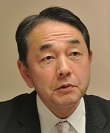 Mr. Kiyoshi Ichimura
Mr. Kiyoshi Ichimura
Partner, Integrated
Reporting Department
Ernst & Young ShinNihon LLC
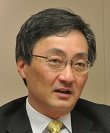 Ken Shibusawa
Ken Shibusawa
Founding Partner & Chairman
Commons Asset Management, Inc.
Fujitsu:
Masami Fujita
Corporate Senior Executive Vice President and
Representative Director
Tango Matsumoto
Corporate Vice President
Vice President, Marketing Transformation Project Office
Minoru Takeno
Head of Environmental Strategy Unit
Kazuo Yuasa
Executive VP, Corporate Finance Unit
Makoto Kouno
Vice President, Public Policy and Business Development Office
* Positions and titles of participants are as of the time the dialogue was held.
Shibusawa: I conduct investment from a long-term perspective. My belief is that the "30-Year Corporation" theory is more properly seen as a "30-Year Business" theory. As the business environment changes, companies have to keep evolving in order to continue. What financial information reveals is the results of the past, while non-financial information, such as environment, society, and governance, contains a company's potential for future evolution.
Ichimura: Integrated reporting calls for concise reporting of a company's long-term value creation capabilities, taking financial and non-financial information as a whole and focusing on the key words of strategy, governance, performance, and outlook. Such a report can be seen as a "corporate strategy report" that aggregates important information concerning the company. Recently, an integrated reporting framework was released by the IIRC (International Integrated Reporting Council*1, attracting a response from global companies.
Matsumoto: In the past, Fujitsu had not systematically addressed communication regarding its product groups and technologies. However, last year we summarized the values we hope to deliver to customers in the form of the FT&SV*2. We have held dialogues with and received feedback from a number of stakeholders, and, based on that, will create revised editions of the FT&SV that make Fujitsu's Value Proposition easier to understand.
Shibusawa: In ICT, the evolution from analog to digital involved an increase in the efficiency of information transmission. Further evolution beyond that will involve a fusion with analog, I think. This is because, like the last mile, there's also the last touch, which is the part that connects to humans. I think that's where Fujitsu's aim of Human Centric is directed.
Takeno: In the environmental field, we talk about sustainability from a long-term perspective of 100 years. I think that contributing to this by creating value through our business is important. I'm also in charge of our Sustainability Report. My aim is to not only produce reports, but to enable every employee to talk to customers about the environment and sustainability.
Ichimura: What is important in integrated reporting is whether the company-wide organization, including business divisions and corporate strategy units, is integrated and conducts governance able to execute strategy. In that sense, reporting is also a tool to create understanding of the company's vision and strategy among employees, who are the longest-term stakeholders.
Yuasa: In order to describe the content of our activities in reports, it is important that we first practice them properly. I feel there is a need to change our awareness of how we work and actively revise our undertakings, such as by encouraging more activity by women and systemizing finance-related operations.
Kouno: Fujitsu segments its organizations based on a current understanding of our markets, but that understanding itself will differ 10 years from now. I think that the significance of considering scenarios for integrated reporting lies in thinking about the vision for our company, our business, and our organizations 10 years ahead.
Fujita: Consideration of human resource strategies within the company tends to be discussions based on the current situation. However, I believe it is necessary to instead base consideration on what we envision for the future. To do so, it would be good to conduct discussions in the format of an advisory board gathering experts from outside the company.
Shibusawa: Nobody knows what the future will bring, but if we sketch the future that we want to see, we can place our focus on making it so. By asking what we will be doing around the time the Olympics are held in 2020, that fuzzy future comes a bit into focus. Sketching a vision for what sort of society we want to create after 2020 is also important as a message.
[Summary of Session 1]
Fujita: In comprehensive communication, we have to pick up and sort information, and tell a story of the future in a simple way. As doing so reveals our sense of values as a company, we will continue discussing our vision for the company and our strategy for 10 years ahead, based on the ideas we received from the experts today.
*1 IIRC (International Integrated Reporting Council):
*2 FT&SV (FIJUTSU Technology & Service Vision)
http://www.fujitsu.com/global/vision/
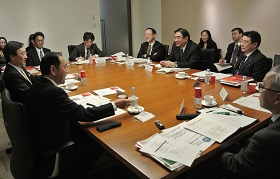 Scene from Session 1 of the Dialogues with Stakeholders
Scene from Session 1 of the Dialogues with Stakeholders
Dialogue Session 2: Thinking Long-Term
Experts:
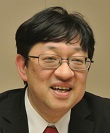 Mr. Hiroaki Kitano
Mr. Hiroaki Kitano
President & Chief Executive Officer
Sony Computer Science Laboratories (Sony CSL)
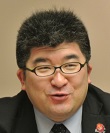 Mr. Motoyuki Hiratsuka
Mr. Motoyuki Hiratsuka
Director, Manufacturing Industries Policy Office
Ministry of Economy,
Trade and Industry
Fujitsu:
Masami Fujita
Corporate Senior Executive Vice President and
Representative Director
Yoshihiko Hanada
Corporate Senior Vice President
Hirofumi Gouda
Corporate Vice President
Hirotaka Hara
Head of Laboratories, Social Innovation Laboratories
Toshihiro Nagashima
Vice President, Monodzukuri (Manufacturing) Business Center
Makoto Kouno
Vice President, Public Policy and Business Development Office
* Positions and titles of participants are as of the time the dialogue was held.
Fujita: Fujitsu has made the realization of sustainable society through the power of ICT the central message of its CSR. Today, we would like to hear your ideas on the theme of "Thinking Long-Term."
Hanada: Taking a long-run view of Japan's industrial structure, we should set our sights on a return to "Made in Japan." I want to use ICT to improve value for customers and bring Japan to the world's attention again.
Nagashima: As a specific activity, Fujitsu has organized the 150-person MONODZUKURI Reform Team, which provides manufacturing support services including manufacturing contracting for small- and medium-sized enterprises.
Gouda: Looking ahead in the health care field to the information society of 2020-2030, we established the Future Medical Care Center. From here on out, we intend to show a vision for a healthy society, starting from individuals' life records.
Kitano: At Sony CSL, we've gathered some crazy people to perform research to contribute to humanity, society, and Sony's businesses through applied basic research. The key point in selecting research themes comes from asking fundamental questions such as whether the research serves the world and people, and whether the research will become a part of history 500 years in the future.
Hara: At Fujitsu Laboratories, last year we established the Social Innovation Laboratories to research responses to long-term social issues (the environment, social infrastructure, etc.) using ICT. Connecting basic research to business will be the key to the continuous resolution of social issues.
Kouno: Since the Abe administration began, the government has created a policy measure package targeting 2020 or 2030. We're in an age in which Fujitsu even has to keep policy movements in mind when thinking about management and business from a long-term perspective.
Hiratsuka: Generally speaking, Westerners are better than Japanese at drawing up long-term visions. At the industry level, too, they end up determining the global standards. Merely sketching a vision is no good. Without making efforts to make it reality, the vision is a castle in the air. We should widen our scope to include the use of standardization and regulatory environments.
Hanada: I had one customer ask me to think about their product plan 100 years from now. However, predicting the future is difficult. As an example, importance has shifted from the automobile as a means of mobility to the automobile as a living space. But even if it is impossible to think 100 years into the future, I want to think 10 or 20 years ahead when considering business strategy.
Fujita: In management, it's important to strike a balance between issues that continue to generate results in the short term, such as technological innovation, and long-term issues such as human resources training. To ask a question about human resources, is there something you're doing to enhance loyalty in researchers?
Kitano: In each of their fields, my researchers are among the top three experts in the world. Whether or not we can retain them depends on my insight as president. It's important that we find a balance between their life success and Sony's success.
Hiratsuka: We should not take diversity, for example, as a social obligation. It's a foundation of long-term improvement of corporate value. It's an opportunity. How can we systemize that and explain it to investors? Also, with regard to evaluations, many companies struggle with whether to place importance on team play or on individual play. In the U.S. and elsewhere, job classifications and capability evaluations are made clear. Those companies think in terms of dividing human resources into those suitable as management and those suitable as players. To achieve diversity that truly enhances management power, we should take the time to create environments for the appointment of young persons and foreigners. A systematic approach that incorporates capability evaluation and compensation systems is a prerequisite.
Fujita: Thinking about management and social responsibility from a long-term perspective conflicts to some degree with quarterly results. I believe it's important that we provide long-term shareholders with not only financial information but also information other than financial, including technological and human resource strategies.
Hiratsuka: I agree. Quarter-based accounting systems encourage a short-term orientation. In Europe it's a system that doesn't exist in principle, and is not a global standard. CSR is to be undertaken from a long-term perspective, and should be a long-term management plan. We should take economic value into account in improving our accountability, and after drawn up future scenarios and an overall vision, should make our priorities and achievement processes clear. In addition, the consistency of reports with securities reports and mid-term plans is important. When we keep this in mind, and when we are able to audit the initiatives across different divisions and units, the results will be more persuasive to investors.
Kitano: We're engaged in electrification projects in Ghana and Okinawa, which came about through the soccer World Cup public viewing that the CSR unit implemented in partnership with JICA and the United Nations Development Programme. It's a good example of facing up to issues in developing countries from a long-term perspective and uncovering business opportunities.
[Summary of Session 2]
Fujita: Through this discussion, we've reaffirmed the importance of presenting a long-term vision to a wide base of stakeholders and fulfilling out duty toward accountability. We would like to learn from the ideas we received today and incorporate them into our future integrated report creation, our global personnel policies, and elsewhere throughout the company.
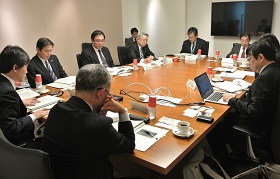 Scene from Session 2 of the Dialogues with Stakeholders
Scene from Session 2 of the Dialogues with Stakeholders
